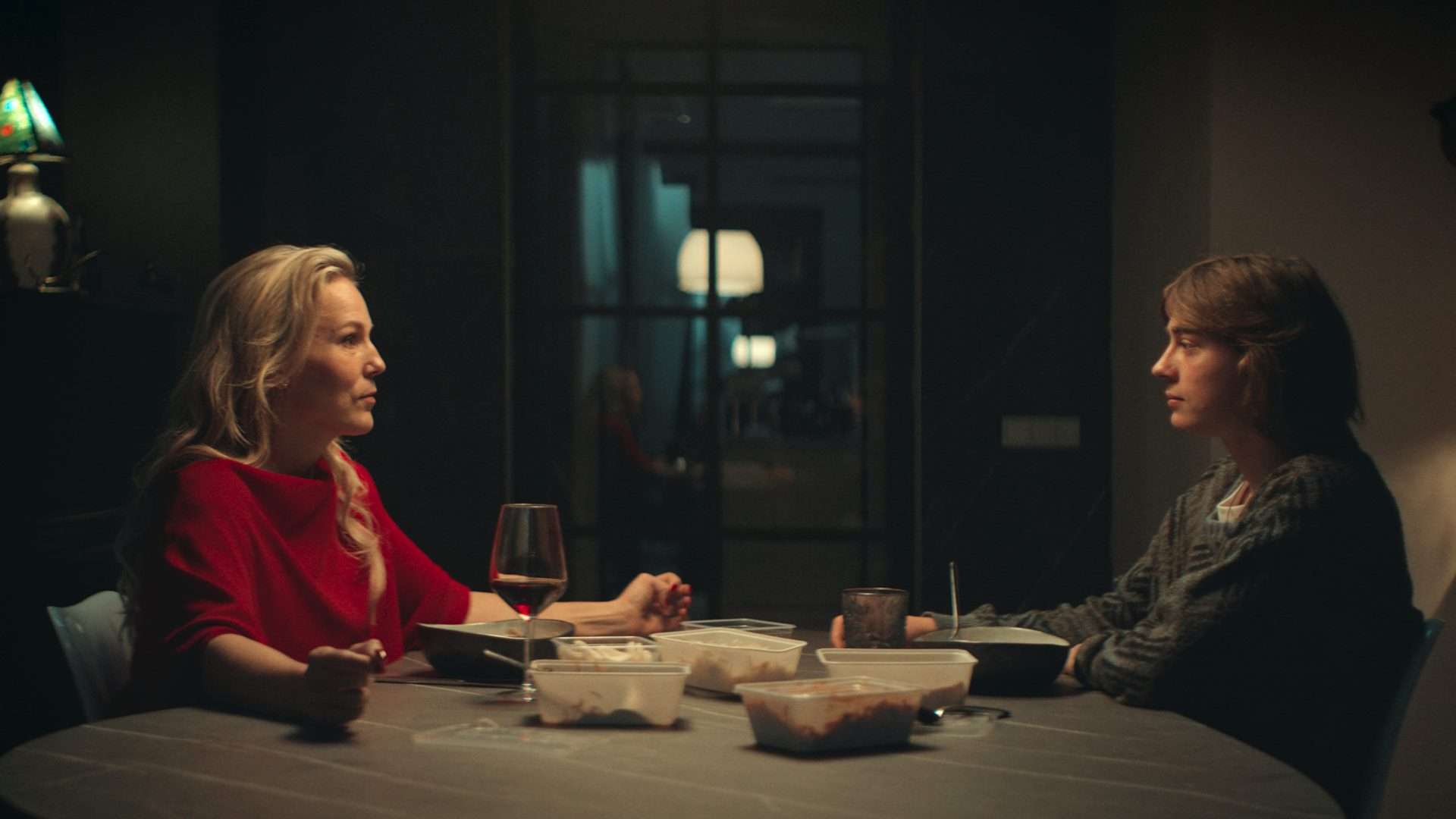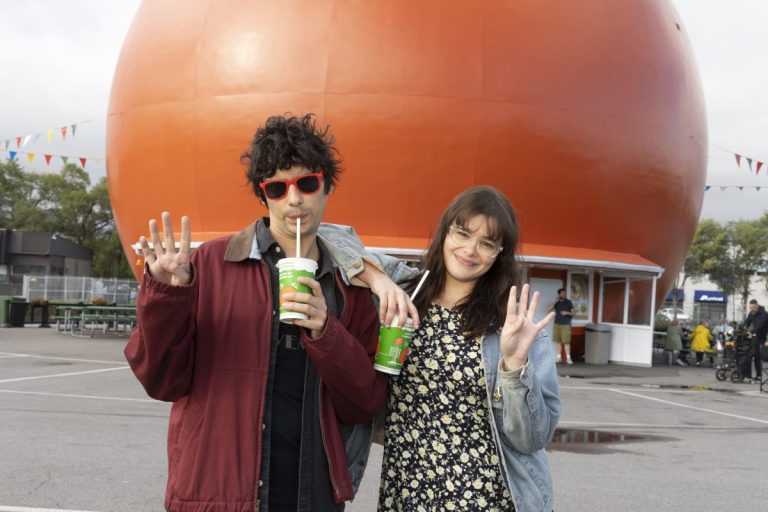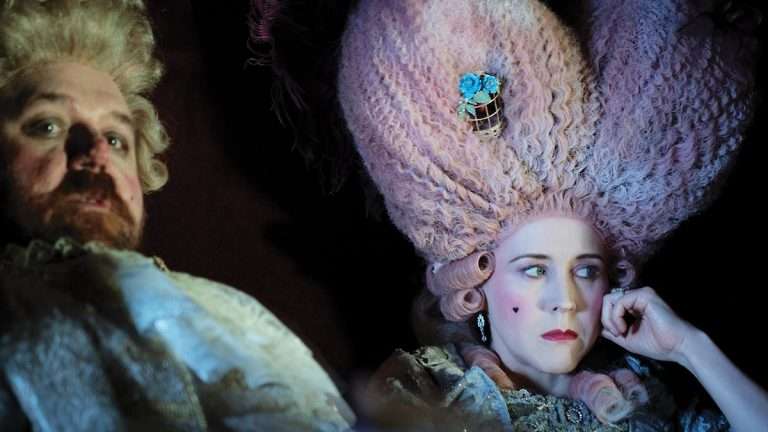Aaron Rookus’s “De Idylle” (Idyllic) is a vibrant, teasing work, by turns melancholic and affirming. Deep emotional scars serrate the characters. Each is battling their own burdened history, much of which is buried in expectations imposed by others, internalized, about the turn their lives can take, and what choices they have. There’s so much regret and guilt about a life led to waste, anguish, and self-deception. It’s the hopeful prayer for second chances at rearranging one’s trajectory that underpins the narrative strands.
This is very much an ensemble drama, Rookus vaulting among various members of a family. The telling resists isolated chunks of perspective; everything is woven together, one reflecting off the other. Projections and echoes shatter the uniformity of an unadventurous life, especially one navigated with balking and caution. This shuts out an entire world of radical, new possibilities.
Two of the film’s central characters, the brother-sister duo of Viktor (Eelco Smiths) and Annika (Hadewych Minis), are faced with urgent reckonings. The former has just learned to accept and embrace his queerness, though not without the usual early awkwardness. He has just broken off from a long relationship with a woman. He’s still uncertain nevertheless curious and plunging.
Annika is hit by the diagnosis of a terminal illness. A terrifying encounter with mortality and impending death sends her into a tailspin. An opera star, she is haunted by the decisions she hesitated at. We watch an iteration she imagines as being in a stalled, dispirited marriage to Musa (Nabil Mallat). The latter is almost disjointed from life, cynical, jaded, and deeply disillusioned. He’s been emotionally distant, unbothered as well on its effects on her. Viktor and Annika’s grandmother Joke (Beppie Melissen) no longer wants to go on living, seeking a way out. But she keeps getting halted by her strapping, young caretaker.
The wonderful thing about “De Idylle” is its tonal malleability. It shifts from the wistful to the surreal, unpredictable in its footing. It’s the kind of film that wishes to ambush you, restlessly whizzing among the many elements in an ensemble piece. No single emotional note is latched onto for too long. The film has an overarching spirit not shy from leaps between the real and imagined.
A simulation can cast a more truthful version of what one desperately aches for, yet denies oneself. Equally palpable and well-realized is Viktor’s gradual journey with his queerness. One of the film’s most potent scenes, which perfectly captures its swinging dramatic pose, is a night with a gigolo (Eli Rietveld). A snatch of sexual pleasure becomes accented with tragic revelations. It encapsulates life’s unexpected absurdities. One moment you may be amidst a thrill, the next surges in repressed mourning.

“De Idylle” comes alive in such liminal moments. Joy arcs into anguish into affirmation within a fleeting span. Rookus orchestrates the multiple threads deftly. The cross-section covers everyone, from the young to the autumnal. A thirst for exploration blends in the narratives with exhausted surrender. What’s admirable about the film is its subtle, slight refusal to expiate to a great, ponderous length on any particular strand.
We stay with one, grapple with the heave of internal strife, and glide to the next scene, with a new character taking over. Rookus establishes the connections with a soft touch. We gauge how much pain and suffering the past has had for its central characters. Viktor and Annika’s parents weren’t the ideal, loving sort of folk who gave enough leeway to their children. A threat of upsetting them, inciting their mother’s rage hovered always. It must have pushed Viktor into a life he might not even have wanted.
“De Idylle” isn’t wholly successful or sparkling in all its sprawl. A strand with Viktor and Annika’s brother especially comes off as wanting. But Smits and Minis firmly anchor the film in an enduring emotional core. The relationship they evoke feels fully lived in. You believe in the agony and grief, no matter that they kick in late. Emo Weemhoff’s camera sweeps through myriad registers and variations in mood, both every day and elevated, with incandescent vitality and uniqueness. Overall, “De Idylle” works excellently as a widening window into the other roads of life that are always there, if only you have more pluck and grab your shot at it.




![Arranged Marriage [2022] Review – An absurd satire that is unable to use its bluntness to good measure](https://79468c92.delivery.rocketcdn.me/wp-content/uploads/2022/12/Arranged-Marraige-2022-Movie-Review-768x405.jpg)

![Look Away, Look Away [2021] Review – An objective albeit broad documentation of racial hatred](https://79468c92.delivery.rocketcdn.me/wp-content/uploads/2021/12/Trump-flag-on-rodeo-float-768x405.jpg)
